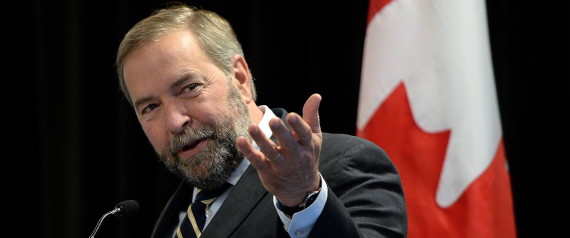If the NDP forms Canada's next government, Thomas Mulcair says he'll put an end to majority governments elected by a minority of the population.
In an op-ed published in Common Ground magazine this week, Mulcair promises that if the NDP has its way the next election will be the last in Canada's history conducted with a first-past-the-post system.
"In the last election, Conservatives formed a majority government with only 39% of the vote," Mulcair writes. "In our current first-past-the-post system, they govern as if they have the support of all Canadians, but the fact is 61% of voters wanted someone else in government."
Mulcair favourably references Germany and New Zealand, which have both adopted proportional representation. Specifically, the two nations use mixed-member proportional representation, the same system favoured by the NDP.
In a mixed member system, a person casts two votes, one for a local representative and another for a party. While different versions of the system have their own quirks, in broad strokes each party ends up with a number of local and national seats that matches the party's overall share of the national vote.
The NDP tabled a non-binding motion late last year calling on the House to end first-past-the-post voting and introduce a proportional system after the next election.
The motion was defeated with the Conservative caucus voting unanimously against it. However, more than half of the Liberal caucus voted for the motion, despite the fact that that Justin Trudeau voted against it. In the past Trudeau has spoke in favour of a preferential ballot system. The Bloc Québécois and the Green Party also supported the NDP motion.
A poll conducted by Environics in 2013 showed that a majority of Canadians (70 per cent) support moving toward some form of proportional representation.
But when proposals for proportional representation have been presented to voters at the provincial level, they have been defeated. In Ontario, Prince Edward Island and twice in British Columbia, voters rejected proportional representation in referendums.
The Conservatives point to these defeats as proof that Canada simply doesn't want proportional representation.
However, the 2005 B.C. referendum actually saw 57.7 per cent of ballots cast in favour of the proposal. However, it failed to reach the 60 per cent threshold set to make the referendum result binding.
Original Article
Source: huffingtonpost.ca/
Author: Michael Bolen
In an op-ed published in Common Ground magazine this week, Mulcair promises that if the NDP has its way the next election will be the last in Canada's history conducted with a first-past-the-post system.
"In the last election, Conservatives formed a majority government with only 39% of the vote," Mulcair writes. "In our current first-past-the-post system, they govern as if they have the support of all Canadians, but the fact is 61% of voters wanted someone else in government."
Mulcair favourably references Germany and New Zealand, which have both adopted proportional representation. Specifically, the two nations use mixed-member proportional representation, the same system favoured by the NDP.
In a mixed member system, a person casts two votes, one for a local representative and another for a party. While different versions of the system have their own quirks, in broad strokes each party ends up with a number of local and national seats that matches the party's overall share of the national vote.
The NDP tabled a non-binding motion late last year calling on the House to end first-past-the-post voting and introduce a proportional system after the next election.
The motion was defeated with the Conservative caucus voting unanimously against it. However, more than half of the Liberal caucus voted for the motion, despite the fact that that Justin Trudeau voted against it. In the past Trudeau has spoke in favour of a preferential ballot system. The Bloc Québécois and the Green Party also supported the NDP motion.
A poll conducted by Environics in 2013 showed that a majority of Canadians (70 per cent) support moving toward some form of proportional representation.
But when proposals for proportional representation have been presented to voters at the provincial level, they have been defeated. In Ontario, Prince Edward Island and twice in British Columbia, voters rejected proportional representation in referendums.
The Conservatives point to these defeats as proof that Canada simply doesn't want proportional representation.
However, the 2005 B.C. referendum actually saw 57.7 per cent of ballots cast in favour of the proposal. However, it failed to reach the 60 per cent threshold set to make the referendum result binding.
Original Article
Source: huffingtonpost.ca/
Author: Michael Bolen

No comments:
Post a Comment